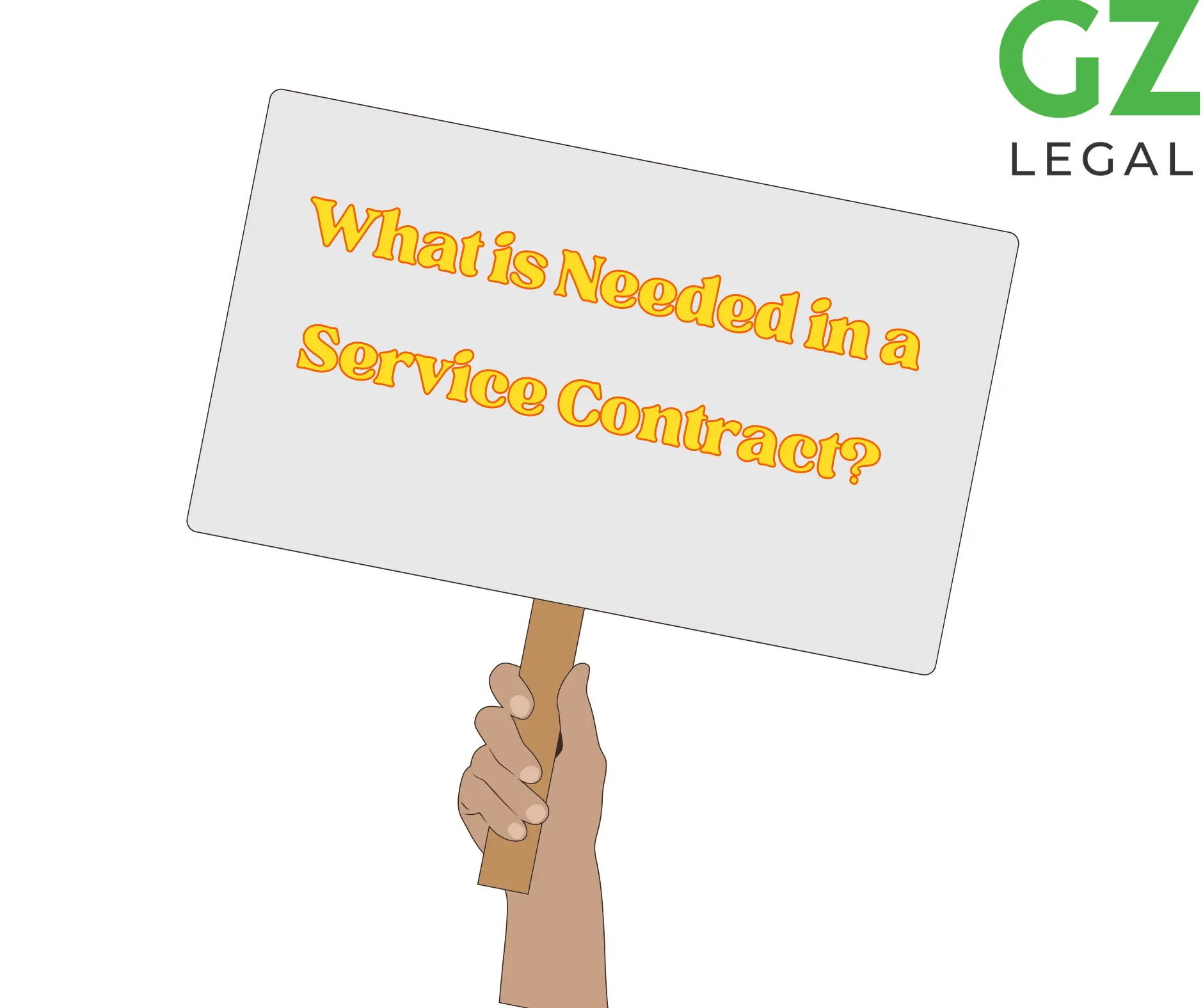Malcolm ZoppiSun Oct 15 2023
What is Needed in a Service Contract? Essential Components Explained
A service contract maintains a mutual understanding and provides legal protection for both parties.
What is Needed in a Service Contract? Essential Components Explained

When entering into a service contract with clients, it’s essential to have a clear and comprehensive document outlining the agreement between the two parties. A well-drafted contract not only ensures a mutual understanding of the agreed terms but also provides legal protection in case of disputes. With the increase in both self employed professionals re-employed workers and contractors, the need for reliable and accessible service contracts has become more crucial than ever.
A comprehensive service contract should include a detailed description of the services to be provided, the responsibilities of each party, the time frame for completing the work, fees, and payment terms, just to name a few. Additionally, incorporating clauses addressing insurance, compliance, indemnification, warranties, and dispute resolution into legal contract can help avoid potential legal issues down the line.
Creating a legally sound and easy-to-understand service contract can be a daunting task, especially when technology and various types of contracts come into play. However, with the right resources and knowledge base, one can confidently draft a robust service contract that meets the needs of all involved parties.
Key Takeaways
- A service contract maintains a mutual understanding and provides legal protection for both parties.
- It should cover essential aspects like service description, payment terms, and dispute resolution.
- Familiarising oneself with different types of contracts and technology applications helps in drafting a tailored contract.
Essential Elements of a Service Contract
Signatures of Parties Involved
One of the first things to include in a service contract is the identification and signatures of the parties involved. This means mentioning the service provider and their direct client. It might also include other parties, business lawyers and representatives, but usually only in more complex agreements. Make sure all parties sign the contract to confirm their acceptance of its terms and obligations.
Offer and Acceptance
A service contract must include an offer made by one party and the acceptance of that offer by the other party. The offer should be clear and specific, detailing the exact nature of the service to be provided. The acceptance of the offer should be unequivocal and clearly show that both parties understand the terms and conditions of the contract. This ensures there are no ambiguities about the obligations of each party.
Consideration and Legality
For a service contract to be a legally binding contract, it must include consideration, meaning both parties commit to providing something of value. This can be a promise to pay money, a promise to perform a service, or a promise not to do something. The consideration should be sufficient and directly related to the terms of the contract.
Finally, the service contract should be legal and enforceable. This means the service contract lawyer and must be in accordance with the law and not involve anything that is prohibited or contrary to public policy. Ensure your service contract abides by all relevant laws and regulations in your jurisdiction.
Content of the Service Contract
Scope of Work
In a service contract, it’s important to clearly define the scope of work. This involves outlining the specific services to be performed and any milestones or deliverables that are expected. By providing a detailed description of the work to be done, you ensure that both parties have a clear understanding of their responsibilities and obligations. This also helps prevent disputes and misunderstandings related to the services provided.
Payment Terms
Establishing clear payment terms is another essential aspect of a service contract. Specify the total amount to be paid for the services and include any deposit requirements or payment schedules. It’s important to lay out the preferred payment method as well, whether it be a direct bank transfer or via an online payment platform. In addition, consider addressing possible scenarios such as late payments, penalties, and interest charges to further safeguard your interests.
Conditions for Termination
A service contract should also define the conditions for termination. Both parties need to be aware of under what circumstances the contract can be terminated and the procedure to follow in such cases. Common reasons for termination may include a breach of contract, the completion of the work, or mutual agreement by both parties. In order to protect yourself and maintain a professional relationship, it is important to clearly state the notice period required for termination and any potential consequences or penalties associated with it.
Rights and Responsibilities
Service Provider’s Rights
As a service provider, you have the right to negotiate the terms of your service contract to ensure a fair and mutually beneficial agreement. You also have the right to the agreed-upon remuneration for the services you provide and to set deadlines for payment. Additionally, you may have the right to retain ownership of any intellectual property developed during the course of the contract, unless otherwise stated in the agreement.
Client’s Rights
Your clients have the right to expect the services outlined in the contract to be carried out in a professional and timely manner. They also have the right to negotiate agreed-upon fees, deadlines and other terms to ensure that their needs are met. Furthermore, clients have the right to access any work produced during the course of the contract, as well as the right to own or utilise intellectual property, depending on the terms of the agreement.
Service Provider’s Responsibilities
As a service provider, your responsibilities include delivering the agreed-upon services to the best of your abilities, while adhering to the terms and deadlines set out in the contract. You must also maintain open and transparent communication with your client, providing updates on the progress of the work. It is your responsibility to ensure that you have the necessary resources and tools to carry out the contracted services, and to manage any subcontractors or employees involved.
Client’s Responsibilities
Your clients are responsible for providing a clear brief and any necessary resources or information to enable you to fulfil the key terms outlined in of the contract. They should also be prompt in providing feedback, approving work or requesting revisions as needed. Timely payment of agreed-upon fees and remuneration is also a key responsibility of the client. Additionally, your clients must respect any intellectual property rights outlined in the contract and communicate any concerns or issues to you in a timely manner.
Legal Aspects of the Service Contract

Capacity
When entering a service contract, it’s essential to ensure that both the parties agree and have the legal capacity to do so. This means that the service provider and the customer are of legal age, mentally capable, and not restricted by any laws that would prevent them from entering or fulfilling the contract terms. Ensuring capacity will protect both parties in case of future claims or disputes.
Confidentiality Clause
A confidentiality clause is an important aspect of many service contracts, especially when sensitive information or trade secrets are involved. When drafting your service contract, include a confidentiality clause that outlines the types of information that must remain confidential, the obligations of both parties to protect that information, and the consequences for disclosing confidential business protected information. This provides both parties with a clear understanding of their obligations and can protect your interests in the event of a breach.
Breach of Contract
It’s crucial to address the potential consequences of a breach of contract within your service contract. A breach occurs when one party fails to fulfil their obligations as outlined in the contract. When this happens, you or the other party may decide to take legal action to enforce the contract or seek damages for losses incurred.
Include a clear definition of what constitutes a breach, and specify the remedies available for both parties in the case of a breach. For example, depending on the nature of the legal and tax point of the breach, you might allow for the opportunity to correct the problem within a specified time frame or to terminate the contract immediately. Additionally, it’s essential to consider any dispute resolution processes, such as mediation or arbitration, that you would like to include in the contract.
Incorporating these key legal aspects – capacity, confidentiality clause, and breach of contract – into your service contract will help ensure that both parties are protected and understand their responsibilities, reducing the risk of disputes and legal action.
Types of Service Contracts

Employment Contract
An employment contract is a legal agreement between an employer and an employee. This contract outlines the terms and conditions governing the employment relationship, such as job responsibilities, salary, benefits, and working hours. As an employee, you have the right to be treated fairly, and your employer has a duty of care to ensure your health, safety and well-being. In turn, you are expected to perform your role diligently and uphold company policies.
Freelance Contract
A freelance contract is an agreement between you (the freelancer) and a client. It outlines the specific services you will provide, the duration of the project, and the payment terms. Unlike an employment contract, a freelance contract often has a fixed-term or is project-based, granting you more flexibility in terms of working hours and location. As a freelancer, you are responsible for managing your own workload, time, taxes, and insurance. There are no employment protections or benefits, such as sick leave or pension schemes, provided to you by the client.
Contract for Services
A contract for services is a legal agreement between a service provider and a client. It is used when hiring a self-employed individual, such as a consultant or contractor, to perform specific tasks or deliverables. Similar to a freelance contract, a contract for services typically outlines the scope of work, payment terms, and project timelines. However, the relationship between the parties under a contract for services is not of an employer-employee nature, meaning that the contractor is responsible for their own taxes, insurance, and other legal obligations. The contractor operates as their own business entity and is not under the direct control of the client’s limited company.
Preparing the Service Contract
Use of Templates
When preparing a service contract, it is helpful to start with a template tailored to your industry. Templates can provide guidance on the essential sections and clauses that should be included in your service contract. A comprehensive template saves time and helps ensure that you address important aspects such as the scope of work, terms and conditions, payment details, and confidentiality clauses and agreements.
Seeking Legal Advice
Although templates can be a great starting legal point for, it is crucial to seek legal advice from a lawyer or solicitor who specializes in contract law. They can help you adapt the template to your specific situation and ensure that it complies with relevant laws and regulations. By seeking legal advice, you can prevent misunderstandings and potential disputes, which may save time and resources in the long run.
Record Keeping
Maintaining proper records of your service contracts is essential for both you and your clients. Keep electronic copies of all documents, including original, signed contracts and any amendments made throughout the course of the service agreement. It’s also good practice to present the contract in a format that is easily accessible, such as a PDF, which will enable everyone involved to refer back to it when necessary.
When preparing service contracts, remember to be confident, knowledgeable, clear, and concise in your communication to promote a positive working relationship. With well-prepared contracts that suit your needs, you’ll be off to a great start in providing services and building lasting partnerships with your clients.
Technology in Service Contracts

Digital Contracts
With the advancements in technology, service contracts have also evolved. Digital contracts are now widely used to streamline the agreement process. These contracts exist in an electronic format and can be stored, accessed, and managed through various digital platforms. Digital service contracts offer several benefits such as easy access, faster processing, improved security, and reduced usage of paper and physical storage. By adopting digital service contracts, you can save time and resources while ensuring that your service agreements are secure and transparent.
Online Contract Tools
To assist in the creation, negotiation, and management of service contracts, there are numerous online contract tools available. These digital resources often come with built-in templates catering to various industries and can be customised according to your specific needs. Some of these tools offer e-signature capabilities, enabling you and your clients to sign contracts remotely, fostering a more convenient and efficient process. Some popular online platforms providing contract management tools include Agiloft, PandaDoc, and ContractSafe.
E-contracts
E-contracts or electronic contracts are legally-binding agreements expressed and concluded using technology and digital means. They may be drafted, negotiated, executed, and stored via electronic systems like computers, smartphones, and digital documents. E-contracts can consist of various formats, such as ePrint documents or digitally signed PDF files.
Using e-contracts provides several advantages, like the ability to quickly draft agreements, expedite the negotiation process, and reduce logistical challenges related to the physical signing and storage of contracts. Furthermore, as e-contracts are increasingly recognised and enforced in many legal jurisdictions, they offer a practical and modern alternative to traditional paper-based contracts.
Frequently Asked Questions
What are the essential elements of a service contract?
A service contract typically includes the following essential elements:
- Scope of services: Clearly define the services to be provided by the service provider.
- Duration: Specify the start and end dates or the length of the contract.
- Payment terms: Outline the payment schedule, amounts, and acceptable payment methods.
- Performance metrics: Identify specific targets and goals to measure the success of the services provided.
- Confidentiality: Address the treatment of confidential information and privacy concerns.
- Termination: Specify the conditions under which either party may terminate the contract, as well as the process for doing so.
Which clauses should be included in a service contract?
In addition to the essential elements listed above, consider including these clauses in your service contract:
- Independent contractor status: Clarify the service provider’s legal status, affirming they are not an employee of your organisation.
- Intellectual property: State who retains ownership of any intellectual property generated during the course of the service contract.
- Liability limitations: Limit the service provider’s liability for any damage or losses related to the provided services.
- Subcontracting: Specify whether the service provider may subcontract any work and under what conditions.
- Dispute resolution: Outline the process for resolving any disputes that may arise between the parties.
How does a service contract differ from an employment contract?
A service contract differs from an employment contract in several ways. Firstly, a service contract is typically used for short-term projects or defined tasks, while an employment contract applies to long-term positions. Secondly, the service provider under a service contract is considered an independent contractor, not an employee, and is therefore not entitled to employment benefits like vacation time or pension contributions.
What role does a service contract play in real estate?
In real estate, a service contract can be used when hiring a service provider to carry out tasks such as property management, maintenance, or repairs. The contract would specify the services to the service provider sign be provided, the terms of compensation, the contract duration, and any other relevant terms and conditions related to the real estate project.
How can I find a free service contract template?
There are various online resources where you can find free service contract templates to use as a starting point. Some websites offer customisable templates designed for specific industries or other service providers and types. Make sure to thoroughly review and adapt the template to fit your specific needs and comply with your local laws and regulations.
Find out more!
If you want to read more in this subject area, you might find some of our other blogs interesting:
- Step-by-Step Guide on How to Transfer Shares to a Holding Company
- Breach of Settlement Agreement: Consequences and Remedies Explained
- Who Gets the Money When a Company is Sold?
- What is a Counter Offer in Contract Law? Explained Simply and Clearly
- Understanding the Costs: How Much Do Injunctions Cost in the UK?
Disclaimer: This document has been prepared for informational purposes only and should not be construed as legal or financial advice. You should always seek independent professional advice and not rely on the content of this document as every individual circumstance is unique. Additionally, this document is not intended to prejudge the legal, financial or tax position of any person.